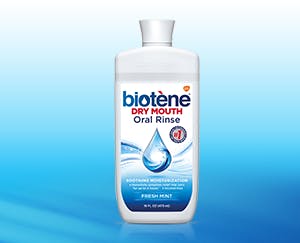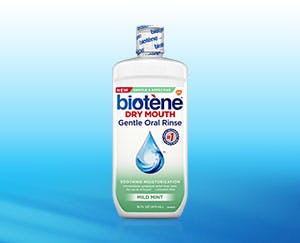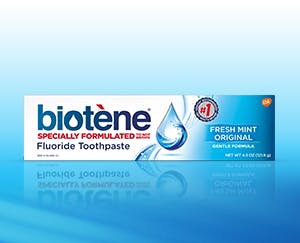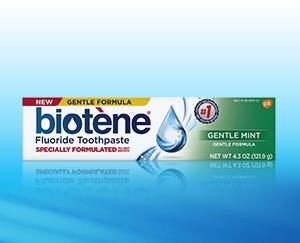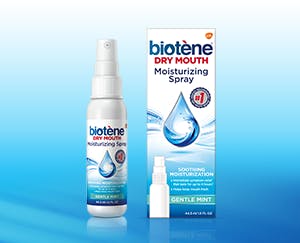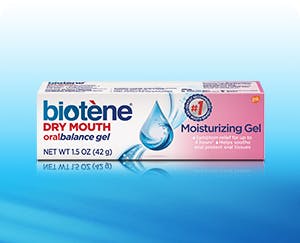Saliva’s role in your overall oral health
Saliva—also called spit1,2—is produced from six salivary glands that are located all around your mouth. Combined, they create one to two liters (two to four pints) of saliva a day—that’s enough to fill between 2-4 8 oz of water!2
What is saliva made of?
Saliva is a clear liquid that—as mentioned above—is produced by our salivary glands. The salivary glands are located inside the right and left cheeks, under the jaw at the front of the mouth, and on the bottom of the mouth.2 Saliva circulation is sometimes referred to as the bloodstream of the mouth, meaning saliva is essential for building and maintaining healthy hard and soft mouth tissue.1 Saliva itself is derived from blood but mostly made out of water, plus a few other chemicals.1,2
A drop in saliva production can lead to Dry Mouth
A steady flow of saliva keeps your mouth moist. If you notice your mouth is often uncomfortably dry or sticky, you may have Dry Mouth. Encouraging saliva production is a great way to reduce your dry mouth.3
What else is caused by lack of saliva?
Dry Mouth symptoms aren’t the only issues you may encounter if the salivary glands in your mouth aren’t producing enough saliva—bad breath (or halitosis), overall discomfort, and difficulty speaking or swallowing can also occur.3 Those without adequate saliva levels may also have problems wearing dentures and oral hygiene issues such as tooth decay, cavities, or other mouth diseases.3
Don’t ignore Dry Mouth symptoms
Without enough saliva to wash away food and debris, you’ll find it harder to keep your mouth healthy.1 You might also find it difficult to break down and taste your food properly.1 The sooner you address your Dry Mouth symptoms—whether at home or with a professional—the better you can maintain your oral health and help your mouth feel comfortable again.
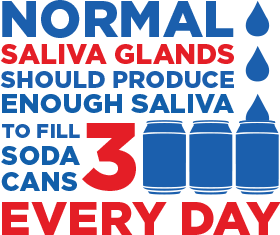

WHAT EXACTLY
DOES SALIVA DO?
The salivary glands in your mouth produce up to one to two liters or two to four pints of saliva every day to help keep your mouth moist and healthy. 2
Here are a few other important things saliva does:1,2
- Helps protect your teeth from decay by providing high levels of calcium, fluoride, and phosphate ions.
- Helps moisten your mouth and helps you speak, chew, and swallow.
- Helps you better taste and enjoy your food—the taste buds can be compromised when they’re dry and need saliva to keep it moist and functioning.
- Helps jumpstart the digestion process by starting to break down food with enzymes while in the mouth.
- Helps push chewed food towards the back of your throat and helps you swallow.
- Helps fight off infections in the mouth.
- Cleans and washes away food from your teeth and gums.
- Helps keep the surface of your teeth strong.
How can I stimulate saliva production?
As mentioned above, chewing is one of the best ways to get your salivary glands working and help promote saliva flow. In addition to chewing, you can also try sucking on ice cubes, sugar-free ice pops, or sugar-free hard candy throughout the day to help stimulate your salivary glands.3 A third option is to drink water or sugar-free liquids, sipping frequently over the course of the day.3
Artificial saliva products like an over-the-counter rinse or spray are also available to help those trying to stimulate saliva production.3 Some people also find that wearing lip balm, using a cool-mist humidifier, or using a mouthwash for Dry Mouth—such as Biotène—can help moisturize your mouth.3
If you’re having difficulty producing saliva, try avoiding the following:3
- Alcohol
- Caffeine
- Carbonated beverages
- Smoking
- Acidic foods and drinks
- Spicy foods and drinks
- Salty foods and drinks
- Dry foods
- Sugary foods and drinks
- Mouthwash with alcohol or peroxide
Biotène® can help manage your Dry Mouth
Get the Dry Mouth management you need with Biotène®—the #1 dentist recommended Dry Mouth brand. Try using Biotène® Oralbalance Moisturizing Gel for long-lasting symptom relief.
Talk to your doctor or dental professional to learn more about how to manage your Dry Mouth symptoms.
- Saliva. MouthHealthy. https://www.mouthhealthy.org/en/az-topics/s/saliva. Accessed 3/17/2022.
- What’s Spit? Nemours KidsHealth. https://kidshealth.org/en/kids/spit.html. Accessed 3/17/2022.
- Dry Mouth (Xerostomia). Cleveland Clinic. https://my.clevelandclinic.org/health/symptoms/10902-dry-mouth-xerostomia. Accessed 3/17/2022.



